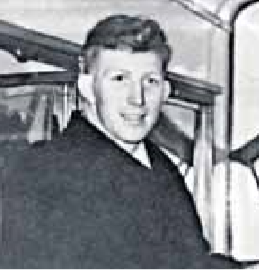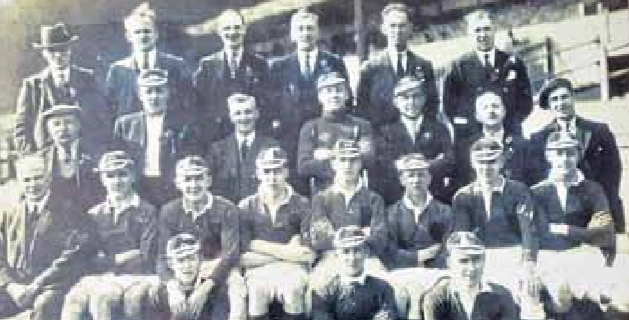Pele, as part of his ambassador duties for Fifa during the 1989 U/16 World Cup, visited Dens Park along with Scotland head coach Andy Roxburgh.
The Dundee FC ground was a venue for some of the group games played, and the great Brazilian – for many years undisputed best player in the world – is shown displaying his talents in front of several local youngsters.
Can we name any of them?
Also, did any go on to play in senior football?
A story aired in this column over a decade ago has surfaced again at the hands of Andy Walker.
However, for the benefit of relatively new readers to this page, it is worth another airing.
The Lochee scribe opened: “In season 1948-49, in the Dundee Half- Holiday League, Central Wednesday FC were playing an RAF Leuchars team on Fairmuir Park.”
Before Andy continues, younger readers may not know about the Dundee Half-Holiday League (this league was also mentioned by another Lochee resident Kenneth Brannan in our May 23 issue).
In the ‘olden days’, a high majority of works, shops and companies gave their workers a half day off on Wednesday afternoons.
This led to the formation of said football league, which was very popular until its demise in the early 1960s.
Back to Andy, and he continued: “Central were playing out of their skins, but the RAF side flew into a 3-0 lead.
“In the second half, the Dundee side had an amazing period as they scored three times to draw level at 3-3.
“Then the RAF player, who had been outstanding over everybody, took the game by the scruff of the neck– amazingly notching three goals in seven minutes.
“The player who played opposite the goalscorer was called Russell Powrie, and he informed Dundee United official Ernie Robertson, who arranged to have the player watched when the airforce side took the field for their next match against YM Anchorage.
“YM were the reigning champions of the Midland Amateur FA but they were brushed aside as the big ‘six-footer’ ran amok, destroying all before him.”
Dundee United were suitably impressed, as Andy continued: “The Tannadice side immediately offered him terms to sign for them.
“Then he dropped the bombshell, he could not sign as he was a Sheffield Wednesday player!
“The player was none other than the great Derek Dooley.
“I say great because what he did in a very short career (four years) was fabulous.

“I believe he also played against Tayport, scoring six times against them.
“Around that time, it is thought that many future stars, who were not from the city, turned out on the pitches in Dundee.”
On May 16, Delia Gallagher appealed for information on an Alex Houston, a Scotsman who played professional football in Wales.
Andy Boyd sent in some details, which suggested he married a Welsh lady called Elsie Jones, who he first met when he went south to play trials for Swansea in 1919.
There are also newspaper cuttings which suggest he was one of three Players signed by the Swans in August that year, the others being T Yule and J Collins.
He may also have played for Southampton, and is reckoned to have lived in the Manchester area in 1948.
Monifieth reader Harry Watson tried to catch me out with an old favourite.
Approaching me in a hostelry, he asked if I knew the name of the golfer who was Open champion for seven consecutive years!
Mind you, Harry’s query stumped the other people in the company.
Calmly settling my sarsaparilla to one side, I responded with Dick Burton.
Englishman Dick won the Open Championship in 1939 and, as the tournament was suspended because of the Second World War, it meant he didn’t defend the trophy until 1946 when Sam Snead won the 75th Open at St Andrews.
Lochee’s Jim Wilson asked which team was most successful in the old Dundee Junior League.
The league ran from 1895-96 until regionalisation in 1969.
Lochee Harp were champions on 20 occasions, which is double that of Dundee Violet on 10.
Carnoustie Panmure picked up seven titles, one more than North End.
Compiling the May 2 issue, which featured an old Carnoustie Juniors photo, one name stuck out.
The surname Boag was attributed to one of the players and I wondered if he could be a family connection to Rob Boag.
Canadian resident Rob often contributes to BwB and, sure enough, 24 hours later, the former Lochee man positively responded.
He opened: “That is a wonderful Carnoustie FC photograph. My Uncle Dickie Boag was in that team, and I’m guessing that photo was taken in 1946-47.
“Sadly, he passed away from cancer in 1948.”
Rob also sent in a photo, and continued: “Dickie is also in the attached Scottish Junior team who played England on April 7, 1933, at Windmill Ground, Leamington.
“Dickie’s in the second row up, third in from the right, and another Dundonian, Jimmy Briggs, is in the same row, second in from the left.
“The score was 2-1 for Scotland, with Dundee lads Boag and Briggs the goalscorers.”
The Scotland team was – Gourley (Dunipace); McDonald (Bonnyrigg Rose), McLure (Parkhead); Corrance (Renfrew), Lyon (Kirkintilloch Rob Roy), McDonald (Tranent); Naughton (Larkhall Thistle), Briggs (Dundee Violet), McKillop (Rosslyn), Duffy (Yoker Athletic), Boag (Lochee Harp).
Football players, managers and staff are always sought for quotes by the media.
I’m continuing to share some of them with you, which are associated with the Scotland international team.
On the night before Scotland visited England in 1928, Scots captain Jimmy McMullen addressed his squad with the words: “Go to your beds and pray for rain!”
The weather duly obliged and, on a slick surface suited to skilled ball-players, the ‘Wembley Wizards’ won 5-1!
https://www.eveningtelegraph.co.uk/fp/blether-with-brown-dundee-solicitors-doug-sanders-st-columba/
